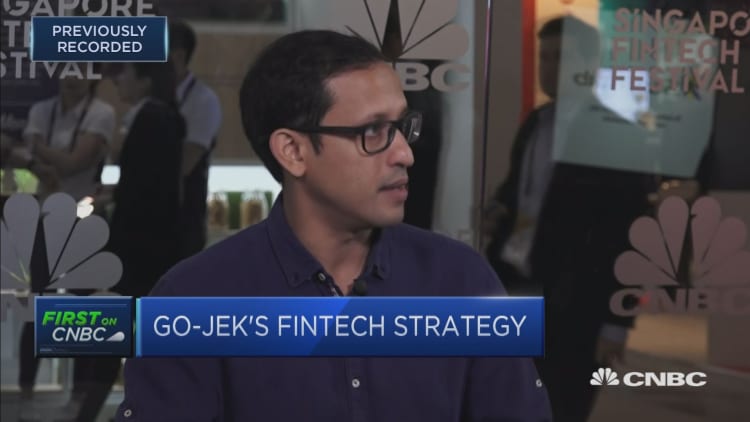
Southeast Asia's largest economy faces a major obstacle to going cashless: The majority of its citizens don't have bank accounts, which means they generally rely on cash for transactions.
But one of Indonesia's start-ups says it's confident of further catalyzing the adoption of e-payment systems in the country.
Go-Jek, a tech "unicorn" reportedly valued at about $3 billion, comprises a ride-hailing, logistics and e-payments business. Those functions will work together to boost the firm's effort to move cash into digital value, the start-up's CEO and co-founder, Nadiem Makarim, told CNBC.
"All of our drivers right now in the network — we have about 850,000 registered drivers — can accept cash to top up people's Go-Pay accounts," Makarim said, referring to the firm's e-payment platform.
Both drivers and riders have an incentive to use the e-wallet: A customer who tops up their Go-Pay account receives discounts for future rides, while their driver gets a points bonus.
The system allows unbanked customers access to the digital wallet, a Go-Jek representative said. The process will even expand to include Go-Jek's partner restaurants, Makarim said.
Indonesia's unbanked population remains large. In 2014, only 36 percent of adults in the country held formal bank accounts compared to the 62 percent globally, according to the World Bank.
That reality presents a massive opportunity for Go-Jek, Makarim said.
"Payments will be our core priority in 2018 ... 2018 will be the year that the Go-Pay app leaves the Go-Jek ecosystem and goes online and offline outside of our application," he said, adding that the e-payment platform aims to be "the number one financial inclusion tool for Indonesians to gain access to these digital goods and services."
The CEO declined to comment on the start-up's acquisition plans or on funding-to-date, but he said it will be announcing fundraising results soon.
The volume of digital payment transactions is projected to hit 726 billion by 2020, with emerging market rates expected to grow thrice as fast as that of developed economies, according to a recent study.

